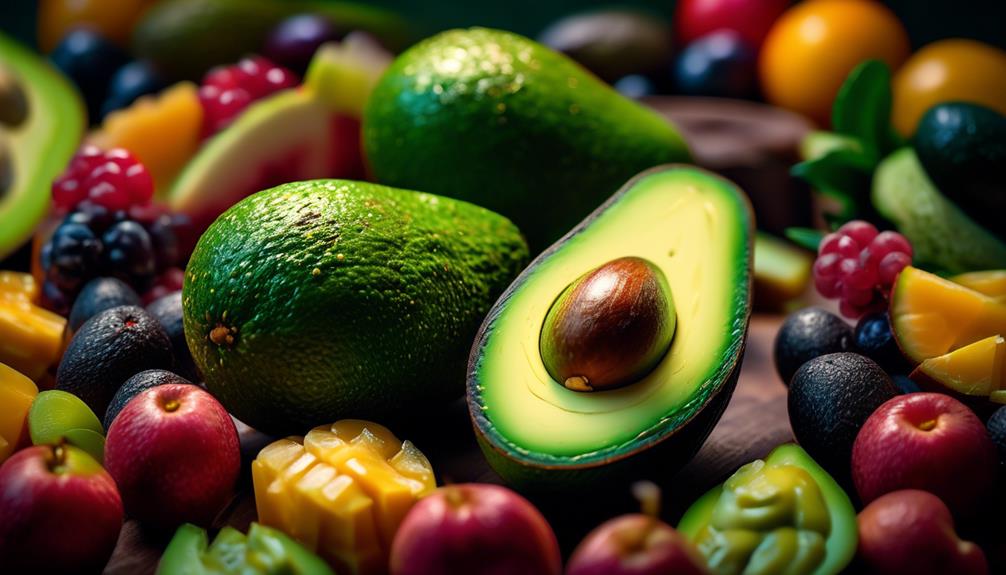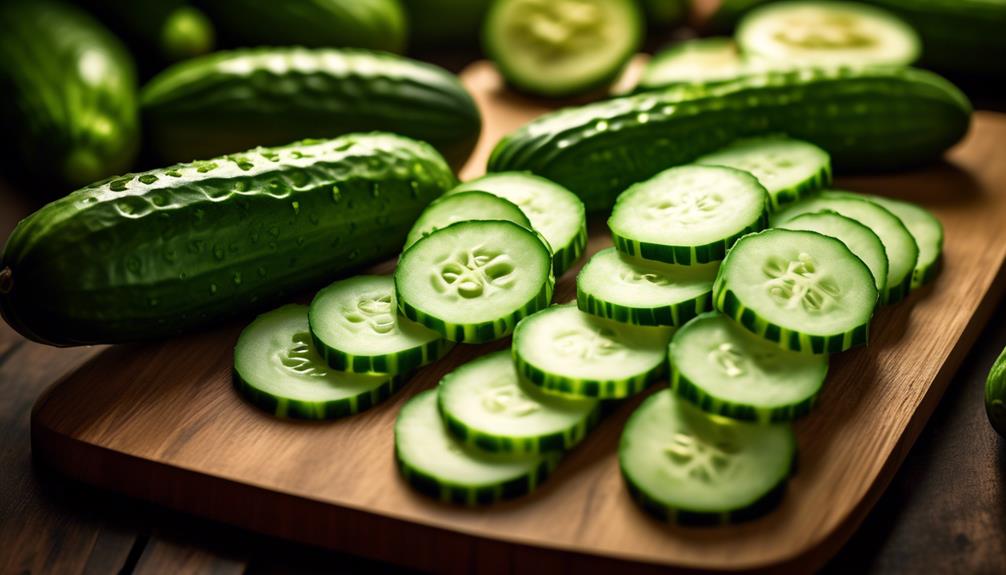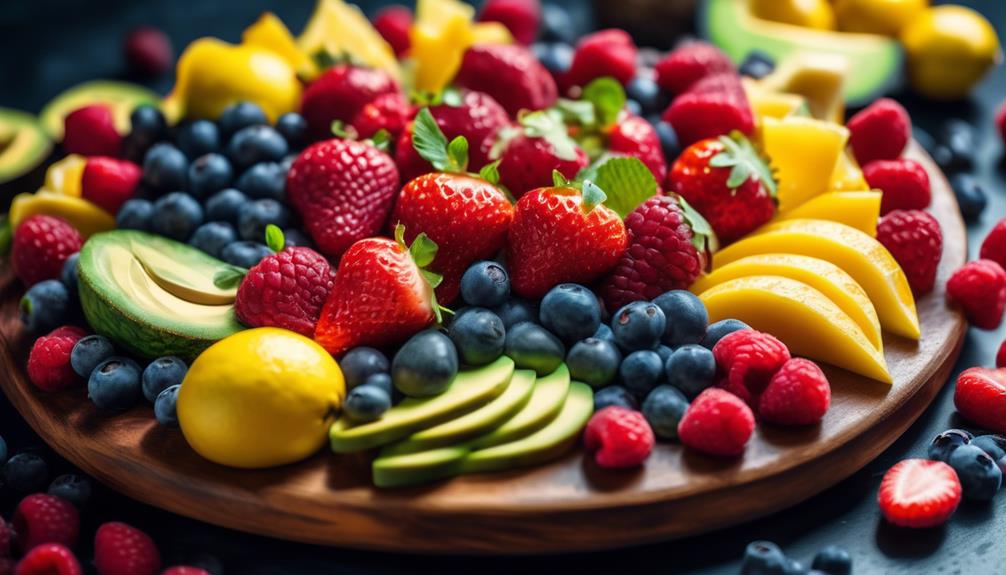Welcome to the fruit aisle of the keto universe, where you can find a bountiful selection of low-carb treasures that will tantalize your taste buds without sabotaging your diet.
Just like a hidden gem in a treasure chest, these vegetarian keto-friendly fruits offer a burst of flavor while keeping your carb intake in check.
Brace yourself for the top 10 fruits that will leave you craving for more, as they not only satisfy your sweet tooth but also support your healthy lifestyle.
Are you ready to embark on a fruity adventure that will redefine your keto journey?
Avocado

Are you looking for a low-carb fruit that's perfect for your vegetarian keto diet? Look no further than avocado! Avocado is a versatile fruit that isn't only delicious but also packed with health benefits. When it comes to avocado recipes, the options are endless. Whether you enjoy it sliced on toast, mashed into guacamole, or blended into a smoothie, avocados can be incorporated into your meals in various ways.
One of the main health benefits of avocados is their high content of healthy fats. Avocados are rich in monounsaturated fats, which have been shown to improve heart health by lowering bad cholesterol levels. Additionally, avocados are a great source of fiber, which can aid in digestion, promote satiety, and help regulate blood sugar levels.
Avocados are also loaded with vitamins and minerals. They're a good source of vitamin K, vitamin C, vitamin E, and B vitamins, all of which play important roles in maintaining overall health. Furthermore, avocados contain antioxidants such as lutein and zeaxanthin, which are beneficial for eye health.
Incorporating avocados into your vegetarian keto diet can provide you with a nutritious and satisfying low-carb option. So go ahead and explore the variety of avocado recipes available to add this superfood to your meals and enjoy its numerous health benefits.
Berries
Berries are an excellent choice for a low-carb fruit option on the vegetarian keto diet. Not only are they delicious, but they also offer numerous health benefits.
Berries are packed with antioxidants, vitamins, and fiber, making them a nutritious addition to your diet. Additionally, there are various types of berries to choose from, such as strawberries, blueberries, raspberries, and blackberries, each with their own unique flavors and nutrient profiles.
Health Benefits of Berries
Numerous research studies have highlighted the remarkable health benefits that berries offer to those following a vegetarian keto diet.
Berries are packed with essential nutrients and antioxidants that promote overall health and wellbeing. They're low in carbs and high in fiber, making them an excellent choice for those on a low-carb diet.
Berries have been shown to improve heart health by reducing inflammation and lowering cholesterol levels. They're also known to enhance brain function and protect against age-related cognitive decline.
Additionally, berries have been linked to improved digestion, weight management, and a reduced risk of chronic diseases such as cancer.
With their delicious taste and versatility, there are endless ways to incorporate berries into your diet. Add them to smoothies, salads, or enjoy them as a healthy snack on their own.
Different Types of Berries
One popular option for those following a vegetarian keto diet is to incorporate a variety of different types of berries into their meals. Berries aren't only low in carbs, but they also offer numerous health benefits.
There are several types of berries to choose from, including strawberries, blueberries, raspberries, and blackberries. Strawberries are a good source of vitamin C and antioxidants, while blueberries are known for their anti-inflammatory properties. Raspberries are high in fiber and contain ellagic acid, which has been linked to cancer prevention. Blackberries are rich in vitamin K and manganese.
All of these berries are low in net carbs and can be enjoyed in moderation on a vegetarian keto diet. Incorporating different types of berries into your meals can add flavor, color, and beneficial nutrients to your diet.
Tomatoes

Tomatoes are a versatile and nutritious addition to a vegetarian keto diet. They offer a range of health benefits and can be prepared in various cooking methods to suit your taste preferences.
Tomatoes are packed with essential nutrients such as vitamin C, potassium, and lycopene, a powerful antioxidant known for its potential to reduce the risk of chronic diseases like heart disease and certain types of cancer. They're also low in carbohydrates, making them an ideal choice for those following a low-carb or keto diet.
When it comes to cooking methods, there are several options to enjoy tomatoes while keeping your carbohydrate intake in check. You can incorporate them into salads, use them as a base for sauces and soups, or even roast them to enhance their flavor. By experimenting with different cooking techniques, you can discover new and exciting ways to incorporate tomatoes into your vegetarian keto meals.
Remember to keep portion sizes in mind, as tomatoes do contain some natural sugars. However, when consumed in moderation, tomatoes can be a delicious and nutritious addition to your vegetarian keto diet.
Lemons
To continue diversifying your vegetarian keto diet, let's now explore the tangy and refreshing addition of lemons. Lemons aren't only low in carbs but also packed with essential vitamins and minerals. Incorporating lemons into your diet can be done in various ways, including consuming lemon water and trying out delicious lemon recipes.
Lemon water is a popular choice for those following a vegetarian keto diet. It's a simple and refreshing drink that can be easily prepared by squeezing the juice of half a lemon into a glass of water. Lemon water isn't only hydrating but also provides a good dose of vitamin C, which is important for your immune system.
In addition to lemon water, there are numerous lemon recipes that you can enjoy while following a vegetarian keto diet. Lemon can be used as a flavor enhancer in salads, dressings, and sauces. It adds a bright and tangy taste that pairs well with vegetables, herbs, and spices.
Some popular lemon recipes for a vegetarian keto diet include lemon roasted Brussels sprouts, lemon garlic cauliflower rice, and lemon herb tofu. These recipes aren't only low in carbs but also full of flavor and nutrients.
Incorporating lemons into your vegetarian keto diet can add a refreshing twist to your meals and provide essential vitamins. From lemon water to flavorful recipes, there are plenty of ways to enjoy the tangy goodness of lemons while sticking to your low-carb lifestyle.
Cucumbers

Incorporating cucumbers into your vegetarian keto diet can provide a refreshing and hydrating addition to your meals. Cucumbers aren't only low in carbs but also packed with beneficial nutrients. Here are three ways you can enjoy cucumbers on your keto journey:
- Cucumber Salad: Whip up a delicious and satisfying salad by combining sliced cucumbers with other low-carb vegetables like cherry tomatoes, bell peppers, and radishes. Drizzle with a tangy dressing made from olive oil, vinegar, and herbs for a burst of flavor.
- Cucumber Smoothies: Blend cucumbers with avocado, spinach, and coconut milk for a creamy and nutritious keto smoothie. Add a scoop of low-carb protein powder to make it more filling. This refreshing smoothie is a great way to start your day or curb hunger between meals.
- Cucumber Water: Infuse your water with slices of cucumber for a refreshing and hydrating drink. Not only does it taste delicious, but it also provides a natural detoxifying effect.
Cucumbers aren't only versatile but also a great source of vitamins, minerals, and antioxidants. They're low in calories and high in water content, making them an excellent choice for staying hydrated on a keto diet. So, go ahead and incorporate cucumbers into your meals to add a refreshing twist to your vegetarian keto journey.
Bell Peppers
If you enjoyed the refreshing crunch of cucumbers on your vegetarian keto journey, you'll love incorporating bell peppers into your meals. Bell peppers aren't only low in carbohydrates but also packed with nutrients, making them an excellent addition to your keto recipes.
One of the main benefits of bell peppers is their low carb content. In a half-cup serving, bell peppers contain only around 3 grams of net carbs, making them a suitable choice for those following a keto diet. These vibrant vegetables are also high in fiber, which can help promote feelings of fullness and aid in digestion.
Bell peppers are also rich in vitamins and antioxidants. They're an excellent source of vitamin C, providing over 100% of the recommended daily intake in just one medium-sized pepper. Vitamin C is known for its immune-boosting properties and plays a crucial role in collagen production, which is essential for healthy skin and joints.
In addition to vitamin C, bell peppers are also a good source of vitamin A, vitamin K, and various B vitamins. They're also packed with antioxidants like beta-carotene, lutein, and zeaxanthin, which can help protect against oxidative stress and promote eye health.
Incorporating bell peppers into your keto recipes can add flavor, color, and nutritional value to your meals. Whether you roast them, sauté them, or use them raw in salads, bell peppers are a versatile and keto-friendly option that can enhance your vegetarian keto journey.
Zucchini

Zucchini is a low-carb fruit that offers numerous nutritional benefits. It's rich in vitamins A and C, as well as antioxidants that promote overall health.
Additionally, zucchini is incredibly versatile and can be used in a variety of keto recipes, from zucchini noodles to stuffed zucchini boats.
Incorporating zucchini into your vegetarian keto diet can add both flavor and nutrients to your meals.
Nutritional Benefits of Zucchini
To fully understand the nutritional benefits of zucchini, it's important to explore its impressive array of vitamins, minerals, and antioxidants. Here are three reasons why zucchini is a great addition to your diet:
- Rich in nutrients: Zucchini is a low-calorie vegetable that packs a punch when it comes to nutrients. It's a good source of vitamin C, which supports immune function, and vitamin A, which promotes healthy vision. Additionally, zucchini contains potassium, magnesium, and folate, which are essential for maintaining proper bodily functions.
- Promotes digestion: Zucchini is high in fiber, making it beneficial for digestive health. Fiber adds bulk to your stool, preventing constipation and promoting regular bowel movements. It also helps maintain a healthy gut microbiome, which is crucial for overall gut health.
- Supports weight management: Zucchini is low in carbohydrates and calories, making it an excellent choice for those following a low-carb or keto diet. It's also high in water content, which can help you feel fuller for longer and reduce calorie intake.
Incorporating zucchini into your diet can be as simple as adding it to salads, stir-fries, or even using it as a healthy substitute for noodles in pasta dishes. With its versatile nature and numerous health benefits, zucchini is a must-have ingredient for any health-conscious individual.
Versatile Uses for Zucchini
Looking to add some variety to your meals? Discover the versatile uses of zucchini that will leave you feeling satisfied and nourished.
Zucchini is a fantastic addition to any diet, as it offers numerous health benefits. One of the most common uses for zucchini is as a low-carb substitute for pasta. By spiralizing or slicing it into thin strips, you can create a delicious and nutritious alternative to traditional noodles.
Zucchini can also be used in soups, stews, stir-fries, and salads, adding a refreshing crunch and mild flavor. Additionally, you can stuff zucchini with a variety of fillings, such as cheese, quinoa, or vegetables, for a hearty and satisfying meal.
With its high water content and low calorie count, zucchini is a fantastic option for those looking to maintain or lose weight while still enjoying delicious and versatile meals.
Zucchini in Keto Recipes
Consider incorporating zucchini into your keto recipes for a low-carb and versatile ingredient that adds both flavor and nutrition. Zucchini is a great addition to your keto meal plans because it's low in carbs and high in nutrients. Here are three reasons why zucchini should be a staple in your keto recipes:
- Nutritional value: Zucchini is rich in vitamins A, C, and K, as well as minerals like potassium and manganese. These nutrients support healthy cell function and provide antioxidant benefits.
- Low-carb option: With only 3 grams of carbs per cup, zucchini is a fantastic low-carb alternative to starchy vegetables. It can be used in place of pasta, rice, or potatoes in various recipes.
- Versatility: Zucchini can be used in a variety of keto-friendly dishes, such as zucchini noodles (zoodles), stuffed zucchini boats, or even as a pizza crust replacement. Its mild flavor and ability to absorb other flavors make it a versatile ingredient.
Incorporating zucchini into your keto recipes not only adds nutritional value but also enhances the taste and texture of your meals.
Olives

Olives are a versatile and flavorful addition to a vegetarian keto diet. These small fruits play a prominent role in Mediterranean cuisine, adding a burst of flavor to numerous dishes. Beyond their taste, olives also offer several nutritional benefits.
Firstly, olives are low in carbohydrates, making them an excellent choice for those following a low-carb diet. They're high in healthy fats, particularly monounsaturated fats, which have been linked to improved heart health and reduced inflammation. Olives also contain a good amount of fiber, which aids in digestion and helps to maintain stable blood sugar levels.
In addition to their healthy fats and fiber content, olives are a good source of various vitamins and minerals. They're particularly rich in vitamin E, a powerful antioxidant that helps protect cells from damage. Olives also contain iron, calcium, and copper, which are essential for maintaining strong bones and a healthy immune system.
When incorporating olives into your vegetarian keto diet, it's important to keep portion sizes in mind. While olives are nutrient-dense, they're also relatively high in calories due to their fat content. Enjoy them in moderation and consider using them as a topping or flavor enhancer in salads, soups, or main dishes to add a burst of flavor and nutritional value to your meals.
Coconuts
Coconuts aren't only delicious, but they also offer numerous nutritional benefits. They're rich in healthy fats, fiber, and essential minerals like potassium and magnesium.
Incorporating coconuts into your vegetarian keto diet can provide you with a satisfying and nutritious option.
Nutritional Benefits of Coconuts
With their rich nutrient profile and versatile culinary applications, coconuts offer a multitude of nutritional benefits for those following a low-carb, vegetarian keto diet. Here are three key benefits of incorporating coconuts into your diet:
- Benefits of Coconut Oil: Coconut oil is rich in medium-chain triglycerides (MCTs), which are easily digested and converted into energy by the body. MCTs have been shown to increase metabolism and promote weight loss. Additionally, coconut oil contains lauric acid, which can boost immune function and help fight off infections.
- Coconut Water Benefits: Coconut water is a natural electrolyte-rich beverage that can help replenish fluids and nutrients after a workout or during hot weather. It's low in calories and carbohydrates, making it a suitable option for those on a low-carb diet. Coconut water also contains potassium, magnesium, and antioxidants, which can support hydration and overall health.
- Versatile Culinary Ingredient: Coconuts can be used in various forms such as shredded coconut, coconut milk, and coconut flour. These can be incorporated into recipes to add flavor, texture, and healthy fats to your meals. Coconut flour, in particular, is low in carbohydrates and high in dietary fiber, making it a suitable option for baking and cooking on a low-carb, vegetarian keto diet.
Incorporating coconuts into your low-carb, vegetarian keto diet can't only enhance the taste and variety of your meals but also provide you with valuable nutrients and health benefits.
Delicious Coconut-Based Recipes
Indulge in a variety of delectable recipes that showcase the versatility and deliciousness of coconut as a key ingredient.
Coconut milk and coconut flour are two fantastic ways to incorporate the unique flavors and textures of coconut into your meals.
Coconut milk can be used as a base for creamy soups, curries, and smoothies. It adds richness and depth of flavor to both sweet and savory dishes. Try making a coconut milk-based Thai green curry or a refreshing coconut milk smoothie with berries and spinach.
Coconut flour, on the other hand, is a great gluten-free alternative to regular flour. It can be used to make fluffy pancakes, moist cakes, and even crispy coconut-coated tofu. Experiment with coconut flour recipes like coconut flour pancakes or coconut flour chocolate chip cookies to add a touch of coconut goodness to your low-carb meals.
Enjoy the tropical taste and numerous health benefits of coconut with these mouthwatering recipes.
Grapefruit

Grapefruit is a low-carb fruit that can be included in a vegetarian keto diet. It isn't only delicious but also offers several health benefits. Here are three reasons why you should consider adding grapefruit to your diet:
- Rich in Vitamins and Minerals: Grapefruit is packed with essential nutrients, including vitamin C, vitamin A, potassium, and folate. These vitamins and minerals play a crucial role in supporting your immune system, maintaining healthy skin, and promoting overall well-being.
- Weight Management: Grapefruit is known for its weight loss benefits. It's low in calories and high in fiber, which helps you feel fuller for longer. Additionally, grapefruit contains compounds that may aid in boosting metabolism and reducing insulin levels, making it an excellent choice for those following a keto diet.
- Heart Health: Consuming grapefruit has been associated with improved heart health. It contains antioxidants and flavonoids that help reduce inflammation and lower cholesterol levels. Regular consumption of grapefruit may contribute to a healthier heart and reduce the risk of heart disease.
Incorporating grapefruit into your vegetarian keto diet is easy. You can enjoy it on its own or try incorporating it into various recipes, such as grapefruit salad or grapefruit-infused water. With its low-carb content and numerous health benefits, grapefruit is a fantastic addition to your keto-friendly fruit options.
Conclusion
As you journey through the world of vegetarian keto-friendly low-carb fruits, you'll discover a vibrant tapestry of flavors and health benefits. Just like a kaleidoscope reveals hidden patterns, these fruits can nourish your body and soul.
From the creamy richness of avocados to the refreshing burst of berries, each fruit offers a unique experience. Embrace the power of nature's gifts and let them guide you towards a healthier, more fulfilling lifestyle.







